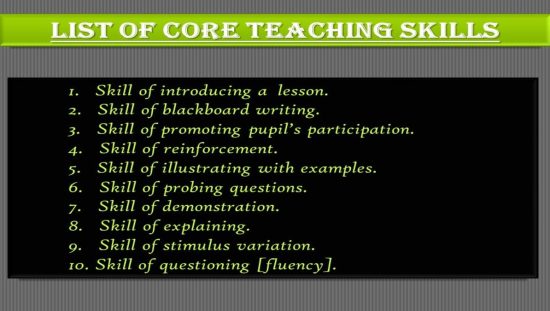Origin and Development of Micro-Teaching
The idea of micro-teaching originated for the first time at Stanford University in USA, when an Experimental Project on the identification of teaching skills was in progress under the guidance and supervision of the faculty members (Bush, Allen, McDonald Acheson and many others). This project was aided by Ford Foundation and Kettering Foundation. The team of experts was assigned the development of testing and evaluation tools to measure the attainment of teaching skills. At this juncture Keath Acheson, a research worker was investigating the utility of video tape recorder in the development of technical teaching skills. This instrument could be used for recording the class interaction and the behaviors of the trainee vividly and accurately. This led to the development of a systematic and accurate method of giving feedback to the teacher trainee.
All the steps of micro-teaching cycle Teach → Feedback → Re-plan → Re-teach → Re-feedback were formulated. Thus the name of micro-teaching was coined for this method of developing teaching skills in 1963. Since then this technique of teacher training has been widely used in almost all Colleges and Universities of Europe and Asia. In Pakistan, it is being used with great emphasis in all the teacher training programs of developing teaching skills and competencies among teacher trainees.
Meaning and Definition of Micro-Teaching
Meaning
Micro teaching is a procedure in which a student teacher practices teaching with a reduced number of pupils in a reduced period of time with emphasis on a specific core teaching skill.
Definition
“Micro teaching is a scaled down teaching encounter in class size and time”
D.W.Allen (1966)
“Micro teaching is defined as a system of controlled practice that makes it possible to concentrate on specified teaching behavior and to practice teaching under controlled conditions.”
D.W. Allen & A.W.Eve (1968)
“Micro teaching is a scaled down teaching encounter in which a teacher teaches a small unit to a group of five pupils for a small period of 5 to 20 minutes”
L.C. Singh (1977)
Objectives of Micro Teaching
- To enable teacher trainees to learn and assimilate new teaching skills under controlled conditions.
- To enable teacher trainees to master a number of teaching skills.
- To enable teacher trainees to gain confidence in teaching.
Characteristics of Micro Teaching
- Micro teaching is a highly individualized training device
- Micro teaching is an experiment in the field of teacher education which has been incorporated in the practice teaching schedule
- It is a student teaching skill training technique and not a teaching technique or method
- Micro teaching is micro in the sense that it scale down the complexities of real teaching
- Practicing one skill at a time
- Reducing the class size to 5 – 10 pupil
- Reducing the duration of lesson to 5 – 10 minutes
- Limiting the content to a single concept
- immediate feedback helps in improving, fixing and motivating learning
- The student are providing immediate feedback in terms of peer group feedback, tape recorded/CCTV
- Micro teaching advocates the choice and practice of one core skill at a time.
Merits of Micro Teaching
- It helps to develop and master core teaching skills.
- It helps to accomplish specific teacher competencies.
- It caters the need of individual differences in the teacher training.
- It is more effective in modifying teacher behavior.
- It is an individualized training technique.
- It employs real teaching situation for developing skills.
- It reduces the complexity of teaching process as it is a scaled down teaching.
- It helps to get deeper knowledge regarding the art of teaching.
Limitations of Micro Teaching
- It is skill oriented; Content not emphasized.
- A large number of trainees cannot be given the opportunity for re-teaching and re-planning.
- It is very time consuming technique.
- It requires special classroom setting.
- It covers only a few specific skills.
- It deviates from normal classroom teaching.
- It may raise administrative problem while arranging micro lessons
OTHER RELATED POSTS



